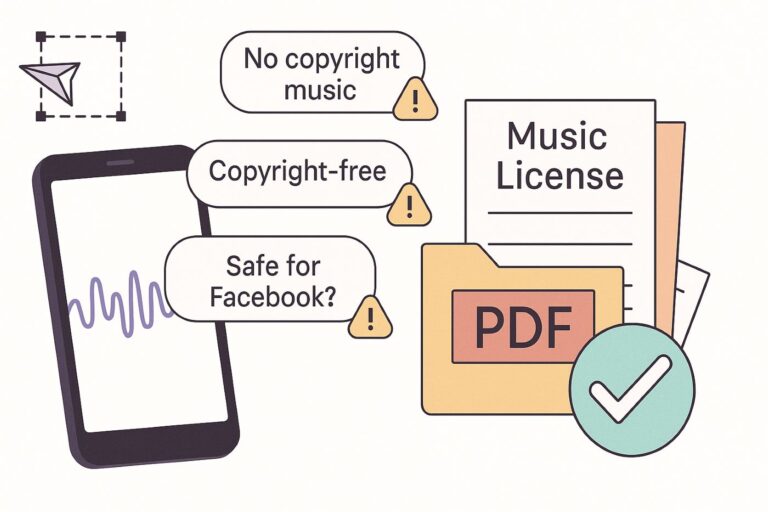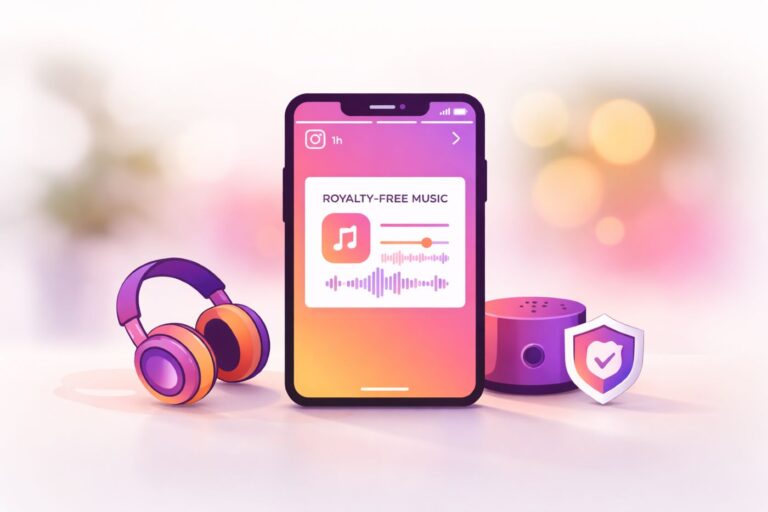TikTok Commercial Music Library: The Only Safe Playlist for Brands
Audiodrome is a royalty-free music platform designed specifically for content creators who need affordable, high-quality background music for videos, podcasts, social media, and commercial projects. Unlike subscription-only services, Audiodrome offers both free tracks and simple one-time licensing with full commercial rights, including DMCA-safe use on YouTube, Instagram, and TikTok. All music is original, professionally produced, and PRO-free, ensuring zero copyright claims. It’s ideal for YouTubers, freelancers, marketers, and anyone looking for budget-friendly audio that’s safe to monetize.
TikTok punishes guesswork, not reach. The moment you act like a brand, your music choices become evidence. This guide shows exactly how to use the Commercial Music Library, where it stops, and how to keep every campaign defensible without killing creativity.
What Is TikTok’s Commercial Music Library (CML)?
To understand when a track is safe for brand use on TikTok, you first need to understand what sits inside the Commercial Music Library and how TikTok designed it for commercial campaigns.
Definition & How It Works
CML is TikTok’s dedicated commercial music library that offers around one million pre-cleared songs and sounds for use in branded content on the platform. TikTok For Business presents it as a global catalog that helps companies quickly find legal soundtracks for their TikTok campaigns.
%201.jpg)
Tracks in the Commercial Music Library come from independent and emerging artists, along with established catalogs and professional music houses that opt into TikTok’s program. This mix gives brands a wide range of genres, moods, and cultural flavors without relying only on mainstream chart hits.
When TikTok marks music as pre-cleared inside CML, it means TikTok has already secured the necessary rights so eligible business users can legally attach those tracks to their TikTok content. Brands do not need to negotiate individual sync licenses for those specific in-app uses.
Every time you use CML, you operate under TikTok’s Commercial Music Library terms that sit on top of TikTok’s general platform rules. You do not receive a private portable license, so rights stay locked to permitted TikTok uses rather than following your content everywhere.
Where You Find It in the Platform
On mobile, open the TikTok app, create or edit a video, tap Add sound, then switch to Commercial Sounds to browse tracks that TikTok flags for commercial use. Business accounts see this section as their primary music source for campaigns and brand posts.
%203.jpg)
On desktop, go to TikTok Creative Center and open the Commercial Music Library, where you can search by track, filter by usage, region, genre, mood, and duration, and preview audio before picking it. This interface functions as a planning workspace for agencies and in-house teams.
%202.jpg)
Catalog options inside CML can change by country because TikTok clears many tracks for specific territories and placements only. You should always set the correct region and review availability in the interface, since a track that appears for one market might not be approved for another.
Who Is CML For (and Who Loses Mainstream Music)?
To use music safely on TikTok, you first need to know which accounts TikTok treats as commercial and how that choice reshapes your access to mainstream tracks.
Business & Organization Accounts
TikTok positions the Commercial Music Library primarily for businesses and organizations that publish promotional or brand content on the platform. When you switch to a Business or Organization Account, TikTok removes access to most mainstream tracks in the general music library, which it reserves for personal entertainment use.
%201.jpg)
With that switch, TikTok expects your brand to rely on music that you can actually justify. You can use tracks from the Commercial Music Library, original music that you fully control, or third-party catalog music where your written license clearly covers TikTok, commercial use, ads, and the regions you target.
Creators Posting Commercial Content
When a creator’s video promotes a brand, product, service, event, discount code, or paid partnership, TikTok treats that content as commercial. TikTok’s own guidance makes clear that music outside the Commercial Music Library is not automatically cleared for this type of use, so creators must secure proper rights.
%202.jpg)
If a creator uses non-CML music in a commercial context, TikTok can ask them to confirm that they hold all necessary rights through Music Usage Confirmation. That step shifts responsibility to the creator or brand, which means any missing license or unclear contract can quickly become their problem, not TikTok’s.
Simple Rule
Treat every brand channel, every sponsored or affiliate post, and every piece of user-generated content created for a client as commercial from the first draft. In those cases, default to the Commercial Music Library or to music that you can prove is fully cleared for that use.
What You Can Do With CML Tracks (On TikTok)
When you pick a track from the Commercial Music Library, you can safely attach it to organic brand posts, branded collaborations, and everyday campaign content on TikTok. The same clearance covers in feed ads and structured ad creatives that you build inside TikTok’s own tools for commercial campaigns.
You can also rely on CML tracks when you boost posts with Promote or use formats like Spark style activations, as long as TikTok flags the sound for commercial use in the library. That protection extends to duets, stitches, and reacts that sit inside a brand or sponsored campaign and use CML or otherwise cleared music.
To keep that protection consistent, start each project by choosing the correct campaign region inside the Commercial Music Library so you only see tracks that TikTok lists for that territory. Then narrow results using usage, placement, genre, mood, and duration filters so the music fits both your targeting and your creative idea.
.jpg)
After you pick a track, record its title, CML link, chosen region, placements, and the date you approved it inside a simple internal log. This habit does not replace proper licensing advice, but it gives your team clear evidence of due diligence if anyone later questions how you selected the music.
What TikTok’s CML Does Not Cover (Critical Limits)
To use the Commercial Music Library safely, you need to understand what TikTok does not promise just as clearly as what it does.
TikTok-Only Rights (No Cross-Platform)
TikTok presents the Commercial Music Library as a way for businesses to soundtrack their content on TikTok with pre-cleared tracks selected for that environment. Official documentation speaks about commercial use on TikTok and does not grant rights for YouTube, Instagram, television, podcasts or other channels.
%201.jpg)
Because TikTok limits its commitment to activity on its own platform, you should treat every CML track as locked inside TikTok unless you secure a separate license directly from the rightsholder for other uses.
No Ownership, No Blanket Sync
When you choose a CML track, you only gain permission to use it under TikTok’s rules for eligible commercial content on that platform. You do not own the recording or any share of the underlying composition, and TikTok’s own pages confirm only pre-cleared usage, not transfer of rights.
CML access also does not replace a proper sync license that you can move across platforms or campaigns in your own name. If you want the same track in television spots, pre-rolls, or long-form brand films outside TikTok, you need a separate license that clearly covers those uses.
Every use of CML music stays connected to the limits inside TikTok’s Commercial Music Library terms and wider platform policies. The moment you use that audio outside those defined conditions, you step out of the protection that CML provides and you carry the full legal risk.
Regional & Catalog Limitations
TikTok instructs advertisers to search the Commercial Music Library using the region where they plan to run content because many tracks clear only for specific territories or placements. When you filter by country, you see a version of the catalog that reflects those licensing boundaries and usable placements.
%202.jpg)
You cannot assume that a track that appears in one account or market will work globally for every brand profile you manage. You should confirm availability inside the CML interface for each campaign, in each target region, and record that choice as part of your internal compliance trail.
CML vs Other TikTok Music Options
To choose music that survives audits, takedowns, and repurposing, you need to see exactly where the Commercial Music Library fits against every other option inside and outside TikTok.
CML vs the General “Sounds” Library
The general Sounds library holds mainstream tracks, trends, and popular audio that TikTok clears mainly for personal and entertainment style use. TikTok’s guidance does not present this catalog as a safe source for commercial brand content, sponsored campaigns, or formal advertising activity.

Business and Organization accounts do not keep normal access to most of these popular tracks once they switch into that status. When creators or brands still use general Sounds for ads, sponsored posts, or sales content, they move outside the comfort of TikTok’s commercial guidance and invite avoidable compliance risk.
CML vs Original Music
Original music works well when you can prove clear control of both the master and the publishing, with no hidden samples, templates, or unlicensed contributions. In that scenario, you decide how to license the track, and you can align those rights with TikTok and every other channel you need.

If contracts, contributions, or stems feel vague, that track can turn into a legal blind spot once money enters the picture. In those situations, many brands prefer a CML track or a reputable licensed catalog instead of guessing what a bedroom agreement or free beat actually covers.
CML vs Third-Party / Royalty-Free Libraries
Third-party and royalty-free catalogs can sit alongside CML as a strong option when the written terms spell out TikTok usage, commercial campaigns, paid ads, Spark-style amplification, and every territory in your media plan. Clear language that lists platforms, formats, and regions turns that license into a reliable foundation.






If a license does not mention TikTok, paid promotion, cross-platform placements, or geographic scope in precise terms, you should not treat that track as safe for serious brand work. In that case CML or a library with explicit multi-platform coverage gives you a cleaner, defensible choice.
High-Risk Scenarios (and Safe Fixes)
Even careful teams slip when they move fast with trends, so it helps to see where TikTok’s rules collide with everyday habits and how to correct course without drama.
Brand Uses a Hit Song from the General Library
A brand account drops a glossy product video over a famous track from the general Sounds library, and everything looks perfect until enforcement catches up. TikTok’s own guidance makes clear that businesses cannot rely on this catalog for commercial use, so the creative sits on shaky ground from day one.
%201.jpg)
The fix starts with replacing that song with a track from the Commercial Music Library or with music you have properly licensed for TikTok. Update your internal templates, briefs, and creator guidelines so no one treats the general library as a shortcut for campaigns again.
Turning a Creator Post with Non-CML Sound into an Ad
A creator tags your brand in a viral video that uses a popular non-CML track, and the media team wants to Spark it or run it as paid. At that moment, the post stops being casual content and runs into TikTok’s rule that commercial use should rely on CML or fully cleared rights.
The safe move is to agree in advance that sponsored deliverables use CML tracks or other properly licensed music so they qualify for Spark, Promote, and formal ads without last-minute rights issues. If a post uses an unlicensed or general library track, treat it as organic only or rebuild it with compliant audio.
Reposting CML-Based TikToks to Reels/YouTube
A team exports a strong performing TikTok that features a CML track and uploads the same edit to Reels, Shorts, and pre-roll without checking the fine print. That jump introduces real risk, because TikTok frames CML as cleared for use on TikTok and does not grant wider distribution rights.
The cleaner solution is to use tracks from a properly licensed library that explicitly covers all your platforms when you plan multi-channel campaigns. Keep CML tracks for TikTok-specific work and rely on universal licenses when you need one soundtrack that can safely travel everywhere.
How to Audit Your Existing TikTok Content (4-Step Audit)
Start by listing every TikTok profile that represents a business, organization, client, or commercial project so you can separate brand activity from personal experiments. Once you know which accounts carry real legal and reputational risk, you can review their music choices with intent instead of guessing.
Next, go through those brand and creator profiles and flag any post that uses non-CML sounds on a business style channel, any sponsored or tagged #ad content that rides on general Sounds, and any clip that reuses a CML track outside TikTok. This sweep gives you a clear, honest map of where potential problems sit.
For each flagged post, decide what makes practical and legal sense based on its role and risk. You keep content that clearly falls under personal use, you re-cut or re-upload important assets with compliant music, and you secure missing rights only when the value justifies the work.
Close the audit by writing a short, clear internal policy that everyone can understand in one read. Include basic rules for account types, approved music sources, creator deliverables, and multi-platform use so future posts follow a repeatable process rather than individual judgment calls.
If a post still feels uncertain after this audit, run the scenario through the TikTok Music Licensing Tool . Answer a few questions about promos, Spark Ads, and cross-posting, and get a defensible recommendation on CML vs royalty-free vs custom licenses before you publish.
Sourcing legal music for this TikTok
Answer a few items and get a clear recommendation with simple next steps.
Reminder: TikTok designs the Commercial Music Library for content and ads on TikTok. TikTok does not explicitly allow CML tracks outside TikTok. Use royalty free with multi platform rights when you plan to repost.
Your recommendation
Based on your inputs
Embed This Tool on Your Website

FAQs
These questions come straight from how real creators, brands, and agencies struggle with CML in practice, not from theory.
Why does the Commercial Music Library feel limited compared to a personal account?

CML removes most mainstream songs because brands need tracks that are cleared for commercial use on TikTok. Personal accounts surface popular hits for entertainment, not ads. Businesses either choose CML, use fully licensed royalty-free music, or publish original tracks they control from master to publishing.
What trending music can brands use on TikTok and Meta without copyright trouble?

Treat each platform as its own license problem. On TikTok, use CML or music you have rights to for commercial use. On Instagram and Facebook, use rights that explicitly permit those platforms and ads. If a track lacks platform coverage in writing, pick a different song.
Is the TikTok sound library overused and are there songs I should avoid?

Some CML tracks trend inside niches, which can make a campaign feel generic if the sound appears everywhere. Solve that by filtering for mood, tempo, and duration, then audition lesser-used cuts and stems. Distinct edits and strong sound design also keep familiar cues from sounding stale.
Are the sounds available to business accounts actually safe from a legal perspective?

CML tracks are pre-cleared for commercial use on TikTok, which makes them safe for that environment when used as intended. That clearance does not follow your video to other platforms. If you need cross-platform coverage, license a track that lists each platform, ad format, and region in writing.
How do I stop short-form videos from getting muted when I use copyrighted music?

Start with music you can prove you are allowed to use. On TikTok, pick CML or fully licensed tracks. On Reels and Shorts, use licenses that cover those platforms and ads. Keep receipts and cue sheets, avoid gray-area samples, and replace risky sounds before promotion begins.
How to Future-Proof Multi-Platform Campaigns
If your content rarely stays in one place, your music strategy needs to move with it without breaking any rules or killing good work in the edit.
Build Around Universally Licensed Tracks
A track that comes with clear written rights for TikTok, Reels, Shorts, YouTube, paid ads, and allowlisted usage lets your team plan once and publish everywhere. You avoid last-minute swaps, region blocks, or silent edits because the license already matches the way your media actually runs.

When that same license also covers user-generated content, creator allowlisting, and long-running campaigns, you create a stable audio backbone for the brand. You brief influencers with confidence, recycle winning assets across formats, and sidestep the uncertainty that comes with TikTok-only CML rights.
Where CML Fits In Your Strategy
For TikTok first campaigns that stay on the platform and live mainly on a Business or Organization account, the Commercial Music Library gives you fast, compliant choices that match TikTok’s own commercial guidance. You find tracks inside the ecosystem where TikTok already confirms pre-cleared use for eligible accounts.

When you design cross-platform campaigns that need one soundtrack across TikTok, Meta surfaces, YouTube, and paid placements, you should lead with royalty-free or custom-licensed catalogs that spell out multi-channel rights in writing. You then use CML in a supporting role, only for TikTok-specific edits where its limited scope does not create conflicts.
Final Compliance Checklist
Before you publish, run each track through a quick gut check that anyone on your team can follow without legal training. Treat these questions as a simple traffic light that keeps your content in the clear and protects the good work you already produced.
- Is this commercial content, in any direct or indirect way, through sales, sponsorship, client work, or brand promotion?
- Are we posting from a Business, Organization, or brand-facing account that TikTok treats as commercial by default?
- Is the sound from the Commercial Music Library, from our own original catalog, or from a third-party library that explicitly grants TikTok commercial and ad rights in writing?
- Are we planning to use Spark, Promote, or paid distribution on this post, and does the chosen track qualify for those formats?
- Are we keeping CML tracks inside TikTok only and using separately licensed, multi-platform safe music for anything we run on Reels, Shorts, YouTube, or other channels?
If any answer feels unsure, swap the track before launch instead of debating it later. Use this checklist together with your internal guidelines, your licensing partners, and your preferred cleared catalog so every campaign starts with proof, not hope.
Make Every Track Defensible
If a lawyer, label, or platform ever questions a video, your soundtrack should survive that test in one clean explanation. Treat CML, licensed catalogs, and original music as documented choices, not shortcuts, and you turn TikTok audio from a daily worry into a repeatable advantage.

Audiodrome was created by professionals with deep roots in video marketing, product launches, and music production. After years of dealing with confusing licenses, inconsistent music quality, and copyright issues, we set out to build a platform that creators could actually trust.
Every piece of content we publish is based on real-world experience, industry insights, and a commitment to helping creators make smart, confident decisions about music licensing.














